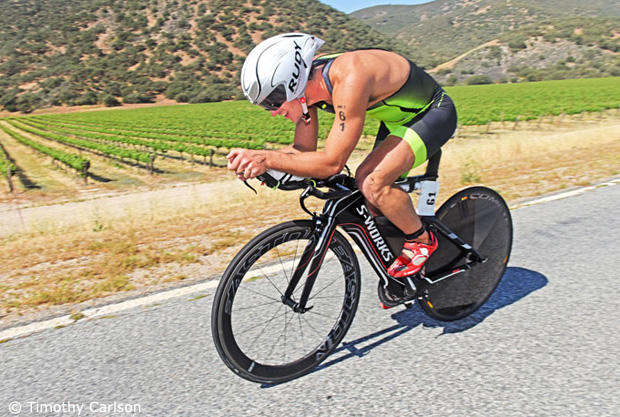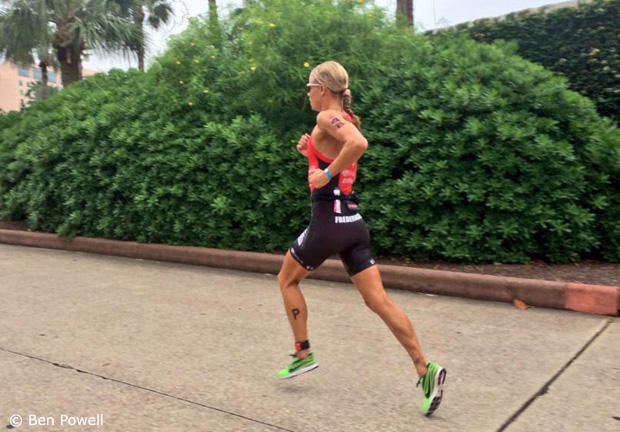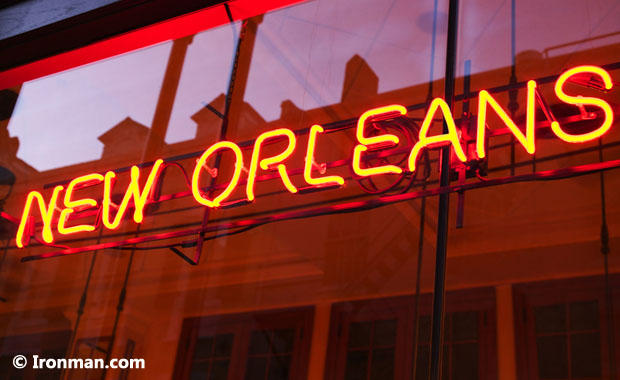Digging deep with Cody Beals
Cody Beals is in his second season as a pro triathlete and has some very fine results to show. This gear meticulous Canadian who is also a popular forum member finished 4th at 70.3 New Orleans and then grabbed 3rd place at 70.3 Texas. Beals races hard but has a very simple lifestyle.
Slowtwitch: Thank you for your time.
Cody Beals: My pleasure. A Slowtwitch interview is an exciting triathlon career milestone. Thank you!
ST: It seems to me that you had a few interviews and curious questions in our forum.
Cody: I thought I’d have to wait for my first professional win to get my very own Slowtwitch thread! It’s flattering that others are interested in what I’m up to, since not long ago I was the one seeking advice in the forum.
I try to be as open as possible when it comes to sharing my experience, and not just the positive aspects. Too often, we only hear about an athlete's successes, while their struggles, insecurities and screw-ups don’t get the same billing. I think that openness helps people appreciate that elite triathletes don’t spring fully-formed from the womb; rather, they’re the product of a long, challenging and nonlinear development process.
Sometimes I wish I could share even more, but I have to respect my coaches’ intellectual property. In fact, both my coaches have scolded me for giving away a little too much at times.
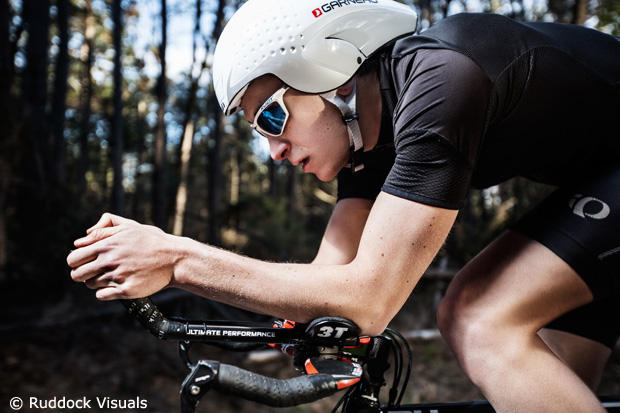
ST: Well, in your rookie season last year you had some nice results, but this year started even better. Is that a fair statement?
Cody: For sure. Last year, I managed a consistent string of top-5 finishes at half distance races. Even so, every time I found myself near the front of the race, it felt like some happy accident. I was just grateful to be there, like a little kid playing with the big boys. Triathlon felt more like a pastime than a profession.
By the end of last season, I knew that I wanted to spin triathlon into something resembling a career. I recognized that this would require a greater commitment to the sport, but it felt risky and impulsive to go “all in” with triathlon before I had solid proof that I could hack it as a pro. I needed to commit to succeed, but I was waiting for greater success before I fully committed.
Faced with this Catch-22 of sorts, I took an uncharacteristic risk and poured everything into triathlon. I reduced my day job as an environmental science consultant to a bare minimum and invested seven months in training without seeing a start line or a cent from triathlon.
It was a relief to see that commitment translate into a good start to the season, but not unexpected and far from some happy accident.
ST: But you do have a career or learned skill that you can reach back to in case this triathlon thing does not pan out.
Cody: I have a Physics degree and a few years of experience working for a boutique environmental consulting firm. I’m keeping my foot in the door there by working about one day per week. The job is quite compatible with pro triathlon since I can work highly flexible hours from anywhere with internet access. My boss is cool with my triathlete alter ego, but I hide it from clients. I’ve even rushed from workouts on to video conference calls wearing a nice shirt for the camera and sweaty bike shorts under my desk.
I’m also a classically trained pianist and I gigged with a ska-jazz sextet for a few years. That was fun, but pro musicians can have an even tougher time than pro triathletes and the late nights were a struggle.
ST: Worse income?
Cody: Especially when it’s split six ways! I can’t imagine trying to earn a living as a pro musician—such long hours of practice for such a small payoff… hold on…
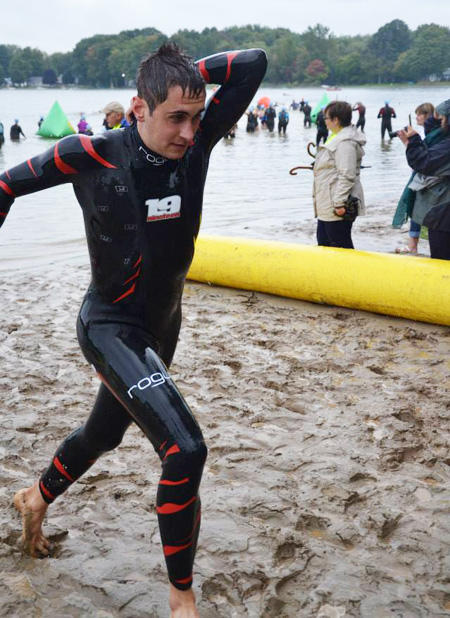
ST: Looking back at last year, was that about what you expected from that new pro season?
Cody: No way! My rookie pro season smashed my very modest expectations. Making the jump to the pro ranks wasn’t even on my radar until late 2013. I was mostly self-coached prior to last spring, I trained almost entirely alone and I had never raced outside my home province of Ontario. I had very little frame of reference to gauge my expectations.
ST: Did you set yourself some kind of goal that you had to reach, money wise or result wise?
Cody: Last year, my goals were vaguely defined and I was thrilled just to snag a few prize paychecks and product sponsors. This year, I’m carefully selecting races balancing specific goals in terms of earnings, exposure and experience (which are sometimes conflicting objectives). I’m aiming for the podium at all my races. Financially, I’m targeting at least $15,000 in prize money this year. Supplemented by a little work and sponsorship income, that will be enough to support my minimalist lifestyle. In terms of sponsorship, I’m eager to find a couple of higher level sponsors, especially a bike sponsor.
ST: You were fourth in NOLA with a very fast bike split. Talk about that race.
Cody: NOLA was a shock to the system. Perhaps it was coming off seven months of mostly indoor training, the Louisiana heat and humidity, or an illness the week before, but every minute of that race was miserable. My coach and I had a very relevant discussion the week before that I drew upon: you don’t have to feel good to race well.
Power was actually well below target on the bike, but the conditions were fast and Trevor Wurtele and I worked efficiently together to ride race-best sub-2:02 splits. Early in the ride, I got my first taste of pack riding at the pro level. Even with by-the-book officiating, the draft advantage at the legal 12 meter spacing strongly influences the dynamics of the pro race. I would like to see more widespread adoption of the 20 meter draft zone for professionals that Challenge has instituted at some races.
For a while, I was running in third and gaining on the leaders, Andy Potts and Matt Chrabot. The misery really ratcheted up on the back half of the run, especially when Tim Reed pitter-pattered past me. I held off a late charge by Ben Hoffman and nearly achieved my lifetime goal of collapsing across a finish line.
ST: What bike were you riding?
Cody: I’m riding a second-hand Cervelo P4 that I recently scored on eBay for a screaming deal. It replaced my trusty old P2 as my “Poor Man’s P5”. It’s built up quite nicely courtesy of the Slowtwitch Classifieds and 3SIXTY5 Cycling. I’m very meticulous—borderline obsessive—about my equipment. I considered blogging about all the aeroweenie touches, but after inspecting other pros’ bikes, I can’t afford to help out some of my less technically inclined competitors that much!
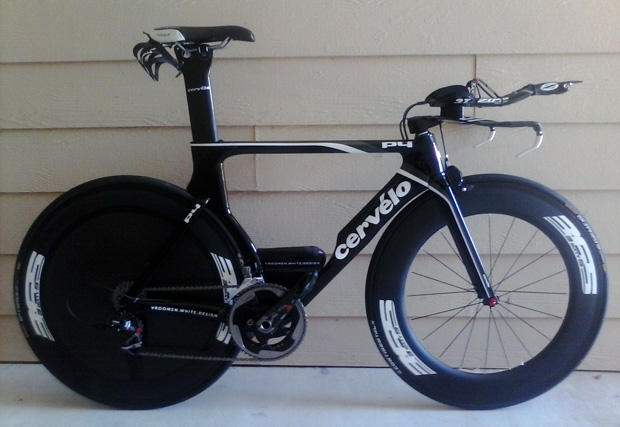
ST: Would you say there are many technically inclined competitors?
Cody: For every dorky aeroweenie like me, there’s an athlete who insists that “it’s all about the engine” or simply doesn’t know any better. I once compared power numbers with a pro roughly my size, with whom I had ridden and eventually passed in a 70.3. I had averaged about 50 watts less than him! He later made some smart equipment and position improvements and is now establishing himself as one of the top cyclists in triathlon. That’s when I stopped giving out advice to other pros!
ST: Oh my. The intrigue.
Cody: I’m protecting his identity because he shouldn’t bear the shame of his past aeroweenie transgressions. He has seen the light.
ST: Maybe you can also tell us what makes you cringe on other bikes.
Cody: Without giving away too many hints, I see a lot of bottles and nutrition mounted in the wrong places, filthy drivetrains, slow tires, cable clutter and suboptimal wheel choices. Also, you wouldn’t believe how many pros are undisciplined about holding aero position.
ST: You stayed in the South and raced 70.3 Texas a week later, and actually were based in The Woodlands for that stretch. Had that been planned all along or was that added on later?
Cody: I planned NOLA and Texas as my first attempt at back-to-back 70.3 races. It seemed like an efficient way to race: one build, one taper and one flight for two opportunities to nail it. I had a moment of panic as I lined up for my second race in seven days, but it turned out to be better than the first.
ST: How did you end up getting connected to Joe Skipper?
Cody: Joe was also staying in The Woodlands as he prepared for Ironman Texas. He reached out to my coaches in search of some training partners. As two young, foreign pros, we immediately hit it off. We trained together throughout April and road tripped to NOLA. His running commentary and colorful English dialect kept the trip entertaining, even when our “well dodgy” GPS led us on wrong turns. We also discovered that we both like to lead workouts, resulting in a sub-16 minute 5k brick run a few days before NOLA.
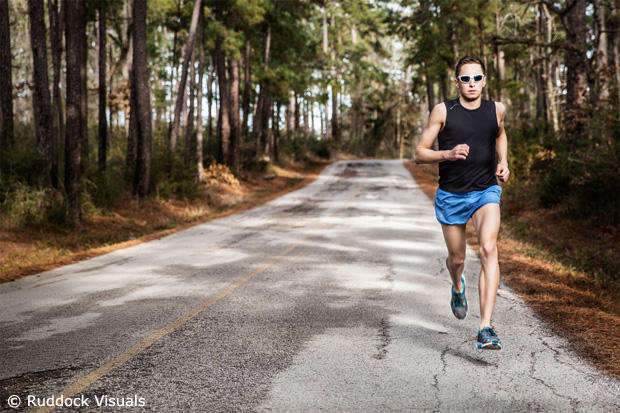
ST: So you raced each other before NOLA in a brick 5k?
Cody: Pretty much. First we rode for a couple hours including 40 minutes of tempo, which is code for all-out time trial. I dusted Joe, but I broke a cardinal rule by using full race gear in training. Off the bike, we intended to run 20 minutes at 70.3 race pace, but that also escalated to a rather optimistic 1:07 half marathon pace!
ST: In 2014 you were 5th in Texas, and this time you managed to get on the podium. What went through your mind when you ran past Giardini to take over third place?
Cody: Texas was my pro debut last year. I was elated to finish 5th at the time, but I had my heart set on the podium this year. Passing Giardini, I was curious to get a closer look at the mystery man who had put together such a spectacular swim-bike combo.
ST: Were you looking over your shoulders to see if anyone was coming?
Cody: There’s no need for shoulder checks with that course’s many out-and-back sections. I expected fast runners like Richie Cunningham and Chris Baird to be chasing hard, but they were unfortunately forced to withdraw due to an unintentional course cutting incident.
ST: Did two Canadians on the podium make much news at home?
Cody: It did within triathlon circles. There’s a wealth of Canadian long course talent right now. On the men’s side, Lionel Sanders, Brent McMahon and Jeff Symmonds have all had major wins over the past year, and guys like Trevor Wurtele and Taylor Reid round out a strong Canadian cohort. It was inspiring to follow their racing during my extended off-season.
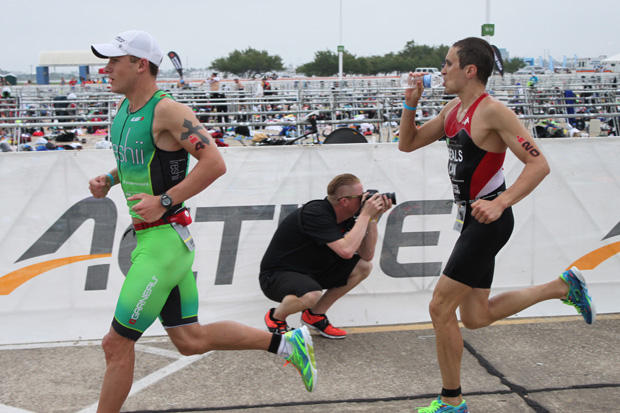
ST: What is next for you?
Cody: I’m taking another shot at back-to-back 70.3 races at Eagleman and Mont Tremblant next month. If all goes well, I hope to qualify for the Ironman 70.3 World Championship. The WC wasn’t originally a goal for this season, but my coaches have convinced me that it would be a worthwhile development experience. There’s a tradeoff however, since chasing 70.3 qualifying points and going to the WC means sacrificing other potentially more lucrative racing opportunities.
I’m particularly sensitive to this dilemma in light of the recently announced reduction of Challenge North America prize purses. I was full of praise when Challenge announced their pro series last year, but I didn’t vote with my feet and sign up for more Challenge races. In fact, I loaded up my season with Ironman 70.3 races at the first sign that I had a shot at qualifying for the WC. As I stated earlier, planning a race season with the optimal balance of potential earnings, exposure and development experience isn’t a simple matter.
ST: You said you did not vote for the Challenge events with your feet. When did you [with help of your coaches] make the decision to be all in Ironman?
Cody: I haven’t decided to stick to Ironman 70.3 events and I hope to race with Challenge later this season. I actually had a few Challenge races penciled in my schedule, but two just had their pro races cancelled and a third slashed its prize purse. So far, Ironman 70.3 races have been a better fit in terms of timing and proximity to my home in Ontario and training base in The Woodlands.
ST: What about these coaches you keep mentioning?
Cody: Last year, I began working with my coach David Tilbury-Davis of PhysFarm and my swim coach Tim Floyd of Magnolia Masters. Having two coaches is a somewhat unconventional arrangement, but David and Tim bring complementary skillsets and perspectives to the table. Based in The Woodlands, they work closely together to co-coach a small roster of up-and-coming pro triathletes. Without their guidance and tough love, I would still be a burnout case on very different trajectory in the sport.
ST: Word has it that you are a very frugal person.
Cody: “Frugal” is definitely the term I prefer, although my parents might suggest “pathologically cheap”. As a pro triathlete, it comes with the territory. More than a few people were shocked by the tight budget I shared on my blog: no car, no cell phone, no Starbucks, vegetarian diet, homestays instead of hotels…
Adopting a simple, minimalist lifestyle has allowed me to escape a conventional career path and pursue what makes me happy. I also take pride in being financially self-sufficient and balancing my triathlon revenue and expenses in my rookie season. More than a few triathlon careers are propped up by parents or significant others.
ST: Keeping hookers and blow to a bare minimum?
Cody: Yeah, the nightlife in rural southern Ontario is wild. I could burn through a prize paycheck faster than you could count the remaining North American pro races.
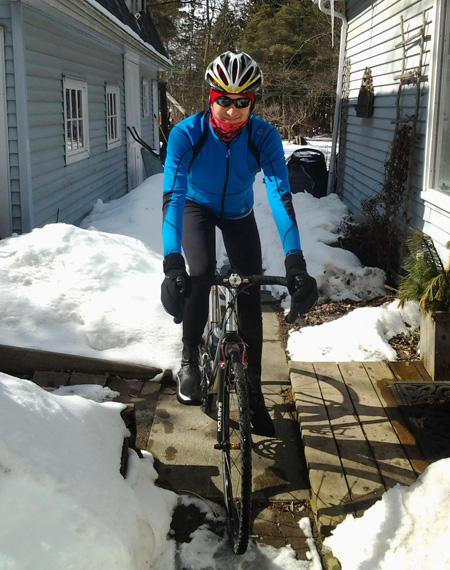
ST: What was the best advice you had been given as you embarked on that pro triathlon mission?
Cody: Triathlon may be an individual sport, but optimizing performance is very much a team effort.
I used to pride myself in being a lone wolf, naively thinking that I could be a self-taught expert in all things triathlon and self-coach my way to the highest level of the sport. It took screw up after screw up to finally realize that my success and longevity in triathlon depend on the support and expertise of others, from coaches, to sponsors, training partners, doctors, family and friends.
ST: Talk about sponsors.
Cody: I’m grateful to work with a small but supportive group of sponsors:
Keystone Communications, owned by Giles Atkinson, is one of my earliest and greatest backers and advisers.
Magnolia Masters, a swim club run by Tim Floyd in The Woodlands, directs my swim training, either at the outstanding team practices when I’m in Texas or remotely when I’m at home in Ontario.
I run in Skechers shoes, roll on 3SIXTY5 wheels and swim in a Nineteen wetsuit and Vorgee goggles. My CompuTrainer is my not-so-secret weapon and Klean Athlete rounds out my nutrition.
ST: Anything else we should know?
Cody: Thanks for the interview and thank you to all the Slowtwitch forum posters who share their advice, expertise and opinions so generously. The forum was a key resource that helped set my pro triathlon adventure in motion.
The website of Cody Beals can be found at codybeals.com and his Twitter handle is @cfbeals



